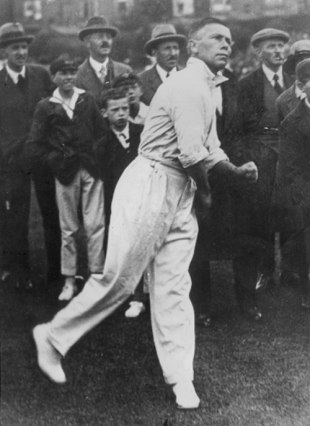10 for 66 and All That
by Arthur Mailey
by Arthur Mailey

| |||
Related Links
Players/Officials: Sir Neville Cardus | Jack Fingleton | Lord Harris | Lord Hawke | Sir Pelham Warner
| |||
Suresh Menon: Today the most prized cricketer might be the one in coloured clothing who hits a ball into the dinner basket of a spectator near third man while intending to clear the fielder at midwicket. But not so long ago, it was the "character" who was the most popular. Of one such, Neville Cardus wrote: "The most fascinating cricketer I have known was the Australian [legspinner] Arthur Mailey, an artist in every part of his nature."
The writer and the cricketer were firm friends; both emerged from slums (though thousands of kilometres apart), both taught themselves to write well, each had a personal manner of demonstrating he had climbed out of the past to walk among kings and prime ministers. Cardus wrote on classical music, while Mailey threw champagne parties.
Mailey once said, "I'd rather spin the ball and be hit for four than bowl a batsman out by a straight one." And on another occasion, "If ever I bowl a maiden over, it is not my fault but the batsman's."
Yet the line he is best known for is the one he wrote in his autobiography, 10 for 66 and All That. He had just dismissed his great hero Victor Trumper, stumped off a googly, and the batsman walked back, pausing only to tell the young bowler, "It was too good for me." Mailey captured that moment thus: "There was no triumph in me as I watched the receding figure. I felt like a boy who had killed a dove." This most glorious of lines in all cricketing literature has, in recent years, had doubts cast upon its authenticity. Yet character is revealed as much by what a man has said as by what he would have said. If it is not factual, it is still truthful, and that's what matters.
Mailey, the only Australian to have claimed nine wickets in a Test innings, was an accomplished cartoonist, and his cartoons, which tell of a time and a place, enrich his autobiography. Even if it were merely a well-written story of an unusual life, 10 for 66 And All That might still have made the cut among the best books on the game. But it is more, its insights and predictions both startling and original.
And another five |
Like those who go against the grain by temperament rather than planning, Mailey displayed a combination of authority and empathy that was unique. He was the one Australian who was sympathetic towards Douglas Jardine and Bodyline. What the series did, according to Mailey, was, it changed the face of cricket reporting. "On the next tour of Australia came an army of 'incident-spotters'," he writes, "just in case there were repercussions that were too newsy... it was then we saw a blast of criticism about umpires' decisions, about playing conditions, about the advisability of players having two or three eggs for breakfast, and of fried liver being on the menu... some of us viewed the future of cricket journalism with apprehension."
Mailey was an accomplished painter too. At an exhibition of his works in London, a royal visitor told him he "had not painted the sun convincingly". Mailey's response was: "You see, Your Majesty, in this country I have to paint the sun from memory."
Mailey, who played his last Test in 1926, was 70 when he wrote this book. And there was nothing wrong with the memory then of the man described by Cardus as an "incorrigible romantic".